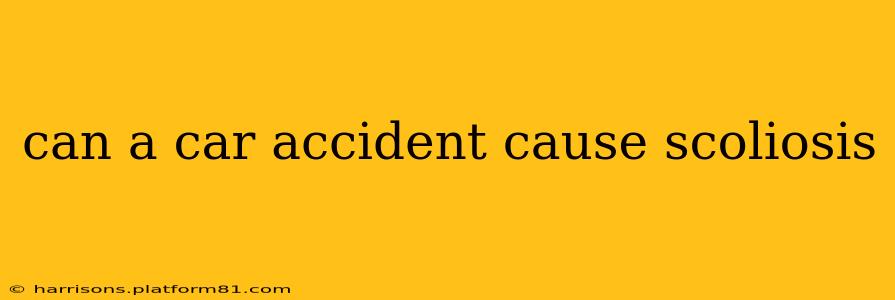Can a Car Accident Cause Scoliosis?
The short answer is: yes, a car accident can potentially cause or exacerbate scoliosis. While not a direct or common cause, the traumatic forces involved in a car crash can lead to spinal injuries that contribute to the development or worsening of scoliosis. This is a complex issue, and the relationship between car accidents and scoliosis is not always straightforward. Let's delve deeper into the specifics.
How Can a Car Accident Lead to Scoliosis?
Scoliosis is a sideways curvature of the spine. A car accident can contribute to scoliosis in several ways:
-
Direct Spinal Injury: The impact of a collision can directly damage vertebrae, ligaments, and muscles supporting the spine. This damage can lead to instability and abnormal spinal curvature, potentially resulting in scoliosis. Fractures, dislocations, and ligament tears are all possible injuries that can contribute to spinal deformity.
-
Muscle Spasm and Inflammation: The body's immediate response to trauma often involves muscle spasms and inflammation. These spasms can pull the spine out of alignment, potentially causing or worsening existing curvature. Chronic muscle imbalances resulting from the injury can also contribute to scoliosis development.
-
Growth Plate Damage (in children): In children and adolescents whose bones are still growing, a car accident can damage growth plates in the spine. This uneven growth can lead to scoliosis developing or progressing more rapidly.
-
Post-Traumatic Stress: While seemingly unrelated, the psychological stress following a car accident can sometimes indirectly affect physical health, potentially exacerbating existing conditions or contributing to the development of new ones. This isn't a direct cause of scoliosis, but it can be a contributing factor to overall spinal health.
What are the Symptoms of Scoliosis After a Car Accident?
Symptoms can vary significantly, but some common indicators that a car accident may have contributed to scoliosis include:
- Uneven shoulders or hips: One shoulder or hip may appear higher than the other.
- Back pain: This can range from mild discomfort to severe pain.
- Visible spinal curvature: A noticeable curve in the spine may be visible.
- Muscle spasms: Tight or painful muscles in the back and surrounding areas.
- Limited range of motion: Difficulty bending or twisting.
- Numbness or tingling: In some cases, nerve compression can cause numbness or tingling in the arms or legs.
It's crucial to note that these symptoms could be indicative of other spinal injuries as well.
How is Scoliosis Diagnosed After a Car Accident?
Diagnosis typically involves a physical examination by a medical professional, followed by imaging tests such as X-rays, MRI scans, or CT scans to assess the extent of spinal damage and curvature. A thorough medical history, including details of the accident, is vital for accurate diagnosis.
Can Scoliosis Caused by a Car Accident Be Treated?
Treatment depends on the severity of the scoliosis and the individual's age and overall health. Options may include:
- Physical therapy: To strengthen back muscles and improve spinal alignment.
- Bracing: In some cases, a brace may be used to support the spine and prevent further curvature.
- Surgery: For severe cases, surgery may be necessary to correct the curvature.
What if I suspect a car accident caused my scoliosis?
If you've been in a car accident and are experiencing back pain, uneven posture, or any other symptoms that might suggest scoliosis, it is vital to seek immediate medical attention from a physician or specialist, such as an orthopedist or neurosurgeon. Early diagnosis and treatment are key to managing scoliosis effectively. They can perform a comprehensive evaluation to determine the cause and recommend an appropriate treatment plan. Don't delay seeking medical care.
This information is for general knowledge and informational purposes only, and does not constitute medical advice. Always consult with a qualified healthcare professional for any health concerns or before making any decisions related to your health or treatment.
